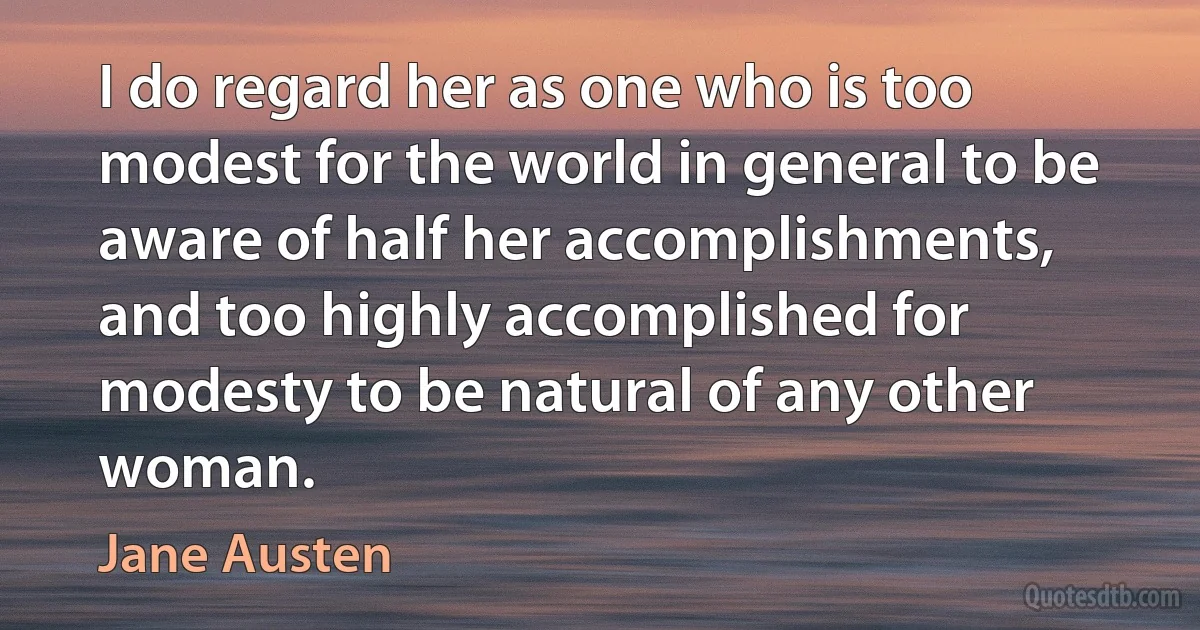Natural Quotes - page 70
Our little visitor has just left us, and left us highly pleased with her; she is a nice, natural, open-hearted, affectionate girl, with all the ready civility which one sees in the best children in the present day; so unlike anything that I was myself at her age, that I am often all astonishment and shame.

Jane Austen
The unity of the Middle Ages as a historical period is quite artificial. In reality they fall into three entirely distinct cultural periods-the natural economy of the early Middle Ages; the courtly chivalry of the high Middle Ages; and the urban bourgeois culture of the late Middle Ages. At any rate, the divisions between these three epochs go deeper than those which mark the beginning and the end of the Middle Ages as a whole.

Arnold Hauser
There can be no question that such a gap existed in early Christian art. What has been praised in it as deliberate simplification, masterly concentration or conscious idealizing and intensifying of the actual is in reality often just incapacity and poverty, just a helpless inability to render natural forms correctly, and a primitive bungling of the drawing.This clumsiness and ungainliness of early Christian art is not mastered until after the Edict of Toleration, when it became the official art of state and court, of aristocratic and educated circles.

Arnold Hauser
You are about to be told one more time that you are America's most valuable natural resource. Have you seen what they do to valuable natural resources?! Have you seen a strip mine? Have you seen a clear cut in the forest? Have you seen a polluted river? Don't ever let them call you a valuable natural resource! They're going to strip mine your soul. They're going to clear cut your best thoughts for the sake of profit unless you learn to resist, because the profit system follows the path of least resistance and following the path of least resistance is what makes the river crooked!

Utah Phillips
The last six years afforded me much time and food for thought. I came to the conclusion that the human race is not divided into two opposing camps of good and evil. It is made up of those who are capable of learning and those who are incapable of doing so. Here I am not talking of learning in the narrow sense of acquiring an academic education, but of learning as the process of absorbing those lessons of life that enable us to increase peace and happiness in our world. Women in their role as mothers have traditionally assumed the responsibility of teaching children values that will guide them throughout their lives. It is time we were given the full opportunity to use our natural teaching skills to contribute towards building a modern world that can withstand the tremendous challenges of the technological revolution which has in turn brought revolutionary changes in social values.

Aung San Suu Kyi
Within a system which denies the existence of basic human rights, fear tends to be the order of the day. Fear of imprisonment, fear of torture, fear of death, fear of losing friends, family, property or means of livelihood, fear of poverty, fear of isolation, fear of failure. A most insidious form of fear is that which masquerades as common sense or even wisdom, condemning as foolish, reckless, insignificant or futile the small, daily acts of courage which help to preserve man's self-respect and inherent human dignity. It is not easy for a people conditioned by fear under the iron rule of the principle that might is right to free themselves from the enervating miasma of fear. Yet even under the most crushing state machinery courage rises up again and again, for fear is not the natural state of civilized man.

Aung San Suu Kyi
... I have no reason to doubt that the universe is the billions of years old that physicists say it is. Further, I find the idea of common descent (that all organisms share a common ancestor) fairly convincing, and have no reason to doubt it. ... I think that evolutionary biologists have contributed enormously to our understanding of the world. Although Darwin's mechanism - natural selection working on variation - might explain many things, however, I do not believe it explains molecular life.

Michael Behe
The natural world has its laws, and no man must interfere with them in the way of presentment any more than in the way of use; but they themselves may suggest laws of other kinds, and man may, if he pleases, invent a little world of his own, with its own laws; for there is that in him which delights in calling up new forms - which is the nearest, perhaps, he can come to creation. When such forms are new embodiments of old truths, we call them products of the Imagination; when they are mere inventions, however lovely, I should call them the work of the Fancy: in either case, Law has been diligently at work.

George MacDonald
Nature has always been recorded by artists, from prehistoric cave paintings to twentieth-century landscape photography. I too wanted to make nature the subject of my work, but in new ways. I started working outside using natural materials like grass and water, and this evolved into the idea of making a sculpture by walking ... My first work made by walking, in 1967, was a straight line in a grass field, which was also my own path, going ‘nowhere'. In the subsequent early map works, recording very simple but precise walks on Exmoor and Dartmoor, my intention was to make a new art which was also a new way of walking: walking as art.

Richard Long
The fundamental tenet of Steiner's teaching is that if we take the trouble to recognize the independent existence of the inner worlds of thought, and keep the mind turned in that direction, we shall soon become increasingly conscious of their reality. We are not, as Sartre believed, stranded in the universe of matter like a whale on a beach. That inner world is our natural home. Moreover, once we grasp this truth, we can also recognize that we ourselves possess an "essential ego," a "true self," a fundamental identity that goes far beyond our usual feeble sense of being "me."

Colin Wilson
The progress of human knowledge depends on maintaining that touch of scepticism even about the most "unquestionable" truths. A century ago, Darwin's theory of evolution by natural selection was regarded as scientifically unshakeable; today, most biologists have their reservations about it. Fifty years ago, Freud's sexual theory of neurosis was accepted by most psychiatrists; today, it is widely recognized that his methods were highly questionable. At the turn of this century, a scientist who questioned Newton's theory of gravity would have been regarded as insane; twenty years later, it had been supplanted by Einstein's theory, although, significantly, few people actually understood it. It seems perfectly conceivable that our descendants of the twenty-second century will wonder how any of us could have been stupid enough to have been taken in by Darwin, Freud or Einstein.

Colin Wilson
While the founding fathers agonized over the question 'particle' or 'wave', de Broglie in 1925 proposed the obvious answer 'particle' and 'wave'. Is it not clear from the smallness of the scintillation on the screen that we have to do with a particle? And is it not clear, from the diffraction and interference patterns, that the motion of the particle is directed by a wave? De Broglie showed in detail how the motion of a particle, passing through just one of two holes in screen, could be influenced by waves propagating through both holes. And so influenced that the particle does not go where the waves cancel out, but is attracted to where they cooperate. This idea seems to me so natural and simple, to resolve the wave-particle dilemma in such a clear and ordinary way, that it is a great mystery to me that it was so generally ignored.

John Stewart Bell
Beginning with adolescence, my political formation was oriented in the ideological direction of Marxism. It was natural, being that my thinking was influenced by an atmosphere of active critical resistance. That was the way it was during all of the dictatorship and up to the Revolution of 1974.

José Saramago
It is widely supposed that the naked human body is in itself an object upon which the eye dwells with pleasure and which we are glad to see depicted. But anyone who has frequented art schools and seen the shapeless, pitiful model that the students are industriously drawing will know this is an illusion. The body is not one of those objects which can be made into art by direct transcription - like a tiger or a snowy landscape. Often in looking at the natural and animal world we joyfully identify ourselves with what we see and from this happy union create a work of art. This is the process students of aesthetics call empathy, and it is at the opposite pole of creative activity to the state of mind that has produced the nude. A mass of naked figures does not move us to empathy, but to disillusion and dismay.

Kenneth Clark



